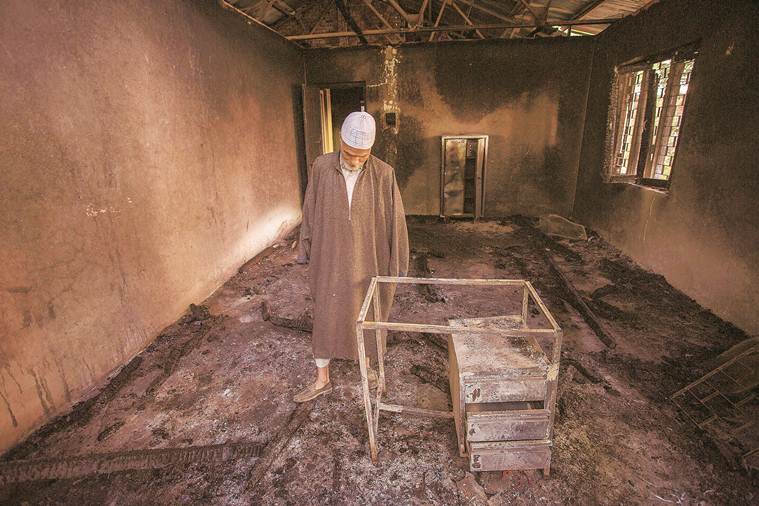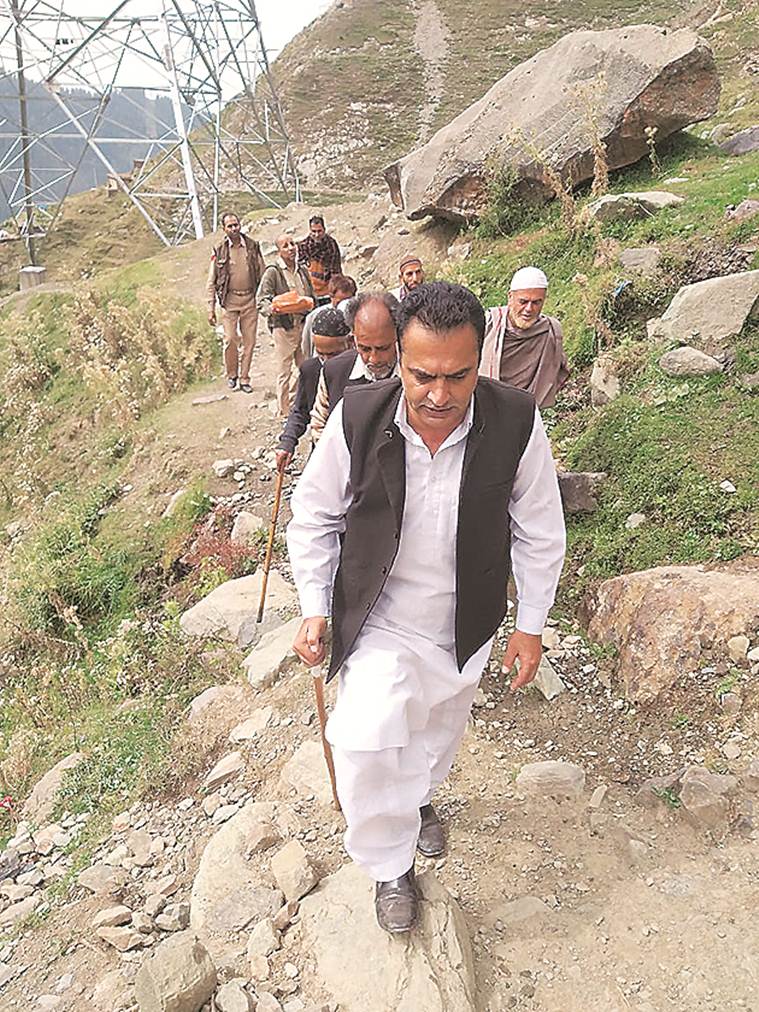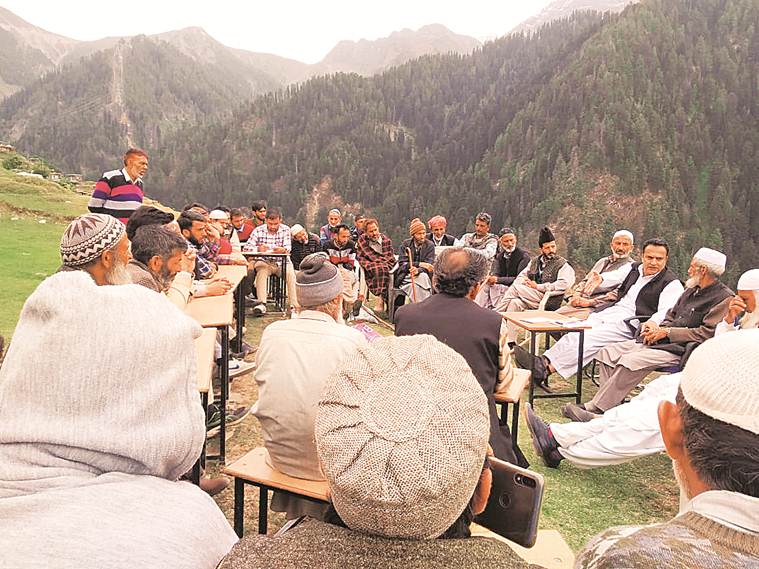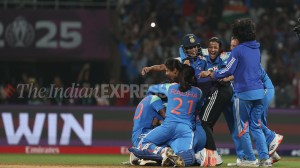Stay updated with the latest - Click here to follow us on Instagram
Blocked polls: Post Article 370, first electoral process underway in J&K
In the first democratic process since the scrapping of special status, elections to 310 Block Development Councils, the second tier in the Panchayati raj system, will be held across Jammu and Kashmir on October 24. The Indian Express look at two sides of an election — one being fought far from the ground, the other with an ear to the ground.
 An abandoned panchayat office in Pampore, Pulwama. (Express Photo by Shuaib Masoodi)
An abandoned panchayat office in Pampore, Pulwama. (Express Photo by Shuaib Masoodi)
Kashmir: Amid unkept promises and fear, an uneasy contest
A mere six kilometres from the district headquarters of Budgam, Ichgam ticks most boxes on development. Two-storied houses dot both sides of the village road, and a Primary Health Centre, and 10 schools dot the landscape. But sarpanch Ghulam Hassan Khan, who is contesting the Block Development Council (BDC) election of October 24 as an Independent candidate from Budgam, says he wants to do more.
“We want the PHC to be open 24×7… We have 550 kanals of vacant government land and I want that converted into a playground for our children. The road, of course, is the first priority,” he says referring to the narrow six-km stretch of the Budgam road leading to the village that is always choked with traffic.
A former CRPF inspector, Khan joined the Congress in 1995. In 2002, he resigned from active politics, only to return in 2014 as the Budgam district president of the BJP. Last year, he was elected unopposed as sarpanch and soon after, quit the BJP to join the People’s Conference, a former BJP ally whose leader Sajjad Lone is now among the leaders detained in the Valley as part of the clampdown on the mainstream political leadership.
 Since the 2018 polls, over a thousand panches, sarpanches and their families have been holed up in hotels across Srinagar, fearing militant attacks. They will now have to go back to their villages to vote in the BDC polls. (Express Photo by Shuaib Masoodi)
Since the 2018 polls, over a thousand panches, sarpanches and their families have been holed up in hotels across Srinagar, fearing militant attacks. They will now have to go back to their villages to vote in the BDC polls. (Express Photo by Shuaib Masoodi)
Since last December, when he was elected sarpanch of Ichgam C, one of four panchayats that make up Ichgam, a village with a population of around 10,000, he has spent most of his time in a hotel room in Srinagar — there had been video messages that threatened to eliminate those standing for panchayat elections. But sometime ago, the 60-year-old shifted back to his two-storey house in Ichgam to remain “closer to the people” he represents and to “raise their issues”.
It’s the first time that elections to the blocks, the second tier of grassroots democracy after panchayats, are being held in Jammu, Kashmir and Ladakh. Questions have, however, been raised over the credibility of the process in the Valley given that the entire mainstream leadership, barring the BJP, is in jail and the National Conference, PDP and the Congress have decided to stay away from the polls that are being held on party lines.
Over 26,000 panches and sarpanches — elected in November-December last year — are now set to vote for the chairpersons of the Block Development Councils in their respective blocks. Any panch or sarpanch can stand for the post of block chairman. In a first, the government has reserved 33 per cent seats for women.
After the final date for withdrawal of nomination papers, 1,065 candidates are in fray for the BDC polls, state election officials said on Saturday, 396 of them from the Valley. The BJP has fielded candidates from all the blocks of Jammu and Ladakh, and from 122 blocks in Kashmir, followed closely by the Panthers Party, which is contesting from less than 50 seats, most of these in Jammu.
Officials claim the BDC elections will pave the way for elections to the District Planning and Development Boards (DPDB), the third tier of panchayati raj, and thus spur development in the state. “It is for the first time that DDB would be emerging out of popularly elected local self-governments,” Chief Electoral Officer (CEO) Shailendra Kumar told The Sunday Express.
 Several panchayat houses were set on fire during last year’s local body elections in the Valley. (Express Photo by Shuaib Masoodi)
Several panchayat houses were set on fire during last year’s local body elections in the Valley. (Express Photo by Shuaib Masoodi)
In the Valley, this optimism is lost on a population that is still in shock over the sudden abrogation of Jammu and Kashmir’s special status on August 5. With the cloud of militant threats hanging heavy since the panchayat election last year and with over a thousand panches and sarpanches holed up in at least seven hotels across Srinagar since then, the BDC election in the Valley is being fought far away the villages, panchayats and blocks that the panchayati system is meant to represent.
It’s lunch time at one such Srinagar hotel and the guests — panches, sarpanches and their families — walk listlessly to the spacious dining hall of the hotel. Since November last year, this has been a routine for the guests who have occupied most of the 100 rooms in this highly fortified hotel.
It was in November last year that Abdul Rashid Dar, 52, moved into this hotel from Pinglish, his village in South Kashmir’s militant stronghold of Tral of which he is sarpanch. Two months ahead of the panchayat elections, a group of militants had swooped down on Dar’s house and beat him up. In a video that went viral, the militants were seen asking Dar to stay away from panchayat elections and to get his son, a Special Police Officer, to resign. Dar apologised and agreed to do their bidding.
Yet, days later, he had filed his nomination as a sarpanch — the only one from Pinglish and the surrounding villages to stand for panchayat elections — and was elected unopposed. Today he is dejected. “These elections don’t mean anything to us,” he says of the BDC polls. “It has been almost 10 months now (since he was elected) but we have not spent even a single penny.”
What also rankles is that he is yet to be officially notified a sarpanch — for such a notification, at least one-third of the elected panch and sarpanch seats in the panchayat need to be filled up.
 A worker at an apple orchard in Srinagar. (Express Archive)
A worker at an apple orchard in Srinagar. (Express Archive)
Of the 7,596 elected panches, 288 haven’t been notified. And of the 1,558 elected sarpanches, 247 still await notification. “When the elections were announced last year, the government made huge promises, they talked of our empowerment… nothing happened. I am un-notified but what about those who have been notified? Have they spent a single rupee on development? How will they face people? What good will these BDC elections do to us or to people?” he says.
A few tables away, Nisar Ahmad Bhat frowns at Dar. A panch from Khigam village of Pulwama, Bhat, who is associated with the BJP, was part of the delegation that recently met Union Home Minister Amit Shah in Delhi, and came back with the assurance that the government would “do everything to empower” panchayats. “These elections are for our own benefit. It is a big step towards democracy… it shows that the government is serious about empowering us,” says Bhat.
The 35-year-old believes the election will remove the “biggest hurdle in the panchayati system” — government officials such as the Block Development Officer and the Village Level Worker. “Once elections to the BDC and District Boards are complete, democracy will thrive. Government officials will be disempowered and elected representatives will take over.”
Bhat was hoping to contest the BDC elections but since his block is reserved for women, he got his wife Rubeena Bano, 25, to contest. Since no other candidate filed nominations, Bano stands to win unopposed from Ichgoza block of Pulwama. With the BDC elections less than a week away, what has been bothering the candidates is the general disenchantment among their voters — panches and sarpanches, who say they have very little to show in terms of work done in their villages.
At the same Srinagar hotel, Mehraj-ud-din Rather, a panch from Krankshivan village in north Kashmir’s Sopore, a separatist stronghold, says none of the development plans he submitted for his village have been approved. After the panchayat polls last year, he had joined the BJP.
“Let me be honest. I haven’t spent a single rupee on my village. Every panch and sarpanch won promising the moon to voters but we have done nothing because we are still waiting for approvals from the DDC (District Development Commissioner),” he says. While government officials agree that approvals for projects have been delayed, they point to the situation in the Valley to explain the slow pace. “The process of approval is multi-tier. The file has to go through four offices — after consultation between panches and sarpanches, it is submitted to the BDO, who forwards it to the District Planning Officer, from where it is forwarded to the District Development Commissioner for final approval,” says a senior official in the Rural Development Department. “It is true that only a negligible amount has been spent so far, must be less than 5 per cent, but we have started the process. We have reports of projects heading towards completion in Baramulla, Kupwara and Shopian districts.”
The government says it has already released the first instalment of the funds. “Under the 14th Finance Commission, Rs 3,000 crore is earmarked for panchayats of the state. We have already released Rs 1,300 crore,” Secretary Panchayat Sheetal Nanda told The Sunday Express. With many of the panches and sarpanches staying away from their villages, what hangs heavy is the fear of voting day itself, when they will have to go back to their villages to vote.
Bhat, the panch from Pulwama who represents the BJP, says the administration has promised them security. “Police have told us that whenever we need to go to our village, we will be provided a vehicle and security,” he says. “It is not fair to say that the government is not securing us”.
Yet, Bhat usually stays away from his village in Pulwama. “All these months, I have not spent a single night in my village. I go there only during the day and don’t stay for more than a few hours,” he says. Government officials also admit in private that the credibility of the BDC election has suffered considering that there are a large number of vacant seats of panches and sarpanches. Of the 18,833 panch wards in Kashmir, 61 per cent of wards are vacant. Of the 2,375 sarpanch wards in the Valley, around 35 per cent are vacant. In fact,
more than 50 per cent of panches and 25 per cent of sarpanches were elected without a contest.
In panchayats without elected representatives, the government has appointed gazetted officers as administrators. “In simpler terms, half the Valley is being run by administrators as it was done before the panchayat polls,” says an official.
At a hotel near the Dal lake, now home to 34 panches and sarpanches and many activists, a fight is building up ahead of the October 24 election. Here, Moulvi Tariq has brought together a group of Independent panches and sarpanches under the banner of the ‘Local Bodies, Panch and Sarpanch Association’. Their aim: “to stop the BJP”.
“Everyone knows why the BJP wants these elections to be held on party lines,” he says. “We have fielded candidates in 38 blocks of the Valley. We won’t let the BJP walk away with it all.”
 Independent candidate Shafiq Mir campaigning in Buffliaz block. (Express Photo by Arun Sharma)
Independent candidate Shafiq Mir campaigning in Buffliaz block. (Express Photo by Arun Sharma)
Jammu: Their concerns: bijli, pani, sadak, and employment
On the Mughal Road that connects Poonch district in Jammu region with Shopian in Kashmir Valley, is Fazlabad in the Pir Panjal region. It’s Shafiq Mir’s first stop of the day. Mir, chairperson of the All Jammu and Kashmir Panchayat Conference, is one of eight Independent candidates fighting the October 24 elections for the office of chairperson of the Block Development Council (BDC) in Buffliaz, one of 11 blocks in Poonch district. With all other parties boycotting the elections, the only other candidate in the fray, besides the eight Independents, is Sushma Dutta of the BJP.
In Jammu, 585 candidates have filed their nominations from 148 blocks, of whom candidates in two blocks (Kishtwar and Mandali) will be elected unopposed. Unlike in Kashmir, in Jammu, where political parties have for long called for strengthening of grassroots democracy,
the announcement of the BDO elections has been met with enthusiasm.
As Mir stops outside the local panchayat ghar, in Fazalabad A, one of the four panchayats that make up the Fazlabad morah, his prospective voters — panches and sarpanches in the block — start assembling. After the formal exchange of pleasantries, the conversation drifts into the problems faced by the panchayat’s 20,000 people — the lack of infrastructure and the “indifference” of successive state governments.
Called “mini Pakistan’’ during the peak years of militancy, Fazlabad had turned its back on militants, helping security forces secure the area by 2005. After all these years, what’s left is a sense of betrayal. “We stood by India during the militancy years and we suffered the most. So many of our own were killed, both by militants and during security operations. What have we got in return?’’ a sarpanch asks Mir.
Villagers point to how, despite the Suran river that flows by and on which the government is constructing the 37.5 MW Parnai hydel power project at an estimated cost of Rs 640 crore, villagers have to call in tankers for their daily needs.
The government high school, set up in the area in the 1970s, has not been upgraded so far, forcing children to walk nearly 12 km to Surankote after they pass Class 10. In the absence of doctors and medicines at the primary health centre, people have to travel to Poonch or Rajouri for any ailment. Some of them get further referred to the Government Medical College Hospital in Jammu, around 250 km away.
Mir, who has been listening intently until now, reminds the panches and sarpanches of his efforts to empower them by bringing them under the banner of his Panchayat Conference. Before leaving, he promises to address their grievances if elected. From Fazlabad, Mir proceeds to Marrah, a panchayat in the Hill Kaka area and the site of the 2003 ‘Op Sarp Vinash’, during which security forces had killed 64 militants. Several local youth had returned home after quitting their jobs in the Gulf, engaging in counter-insurgency operations.
The highs of that operation now well behind them, sarpanch Haji Bashir tells Mir that the present generation now wants jobs — and there are none, he says. “We should get the government to launch a special recruitment drive here by the Army and the paramilitary,” he tells Mir, who promises to get working on that if he is elected. The Marrah panchayat is predominantly inhabited by the Gujjars and a number of them are already in the security forces, police and paramilitary. Nowhere does Article 370 or 35A come in for discussion, not even in Poshana, the village bordering Shopian where militants on October 16 killed a fruit merchant from Punjab and injured another. It’s also Mir’s native village and his next stop of the day.
“There are no good schools in the panchayat and no proper road connectivity either. So a large number of people have shifted to Poonch or Rajouri, nearly 120 km away, for their children’s education. They have to go there for medical care too,’’ says Mir, who is also the sarpanch of Poshana.
Over 300 km away, in Agrachak, a panchayat along the international border in R S Pura block of Jammu district, BJP candidate Yuvraj Singh, accompanied by the party’s former legislator Vikram Randhawa, is campaigning for the October 24 election. He doesn’t forget to credit Prime Minister Narendra Modi for holding the “historic” BDC elections.
But in villages across the block, the panches and sarpanches question him on specifics — the approvals that are stuck, the skeletal staff in government schools and issues of bijli, pani and sadak. At Chandu Chak panchayat in the block, sarpanch Bachan Lal tells Singh, “Panches and sarpanches are yet to get back the money they spent on works undertaken under MGNREGA.’’ Another complained that the development proposals they sent for approval to the BDO office were “held up for no reason”.
As Singh prepares to leave, promising to look into their complaints, Lal says, “Make sure you don’t forget us after winning the elections.”
 Shafiq Mir with panches and sarpanches at Poshana village. (Express Photo by Arun Sharma)
Shafiq Mir with panches and sarpanches at Poshana village. (Express Photo by Arun Sharma)
Panchayati raj: Why local bodies in J&K want more autonomy
Over the last seven decades, panchayat elections in J&K have been held only four times — in 1978, 2001, 2011 and 2018 — instead of every five years as it happens in the rest of the country. The village panchayats elected in 2011 were even dissolved by the then PDP-BJP government before the completion of their five-year term.
Panchayat bodies in Jammu and Kashmir have enjoyed less autonomy compared to those in the rest of the country since the 73rd and 74th amendments to the Constitution, which gave financial and political autonomy to panchayats and municipalities, were never applied to the state. Instead, it was the J&K Panchayati Raj Act that has been in force here and under which the upcoming BDC elections are being held.
While under the J&K Act, it’s the panches and sarpanches who elect the Block Council chairperson, under the provisions of the 73rd amendment, there are direct elections to these posts. Likewise, any citizen from a particular block can contest for the office of block member or chairperson under the 73rd amendment, while the J&K Act says only a sarpanch or a panch can contest for the post of BDC chairperson.
To establish grassroots democracy in the state, the Panchayati Raj Act was first envisaged in 1935 by the then Dogra ruler Maharaja Hari Singh. In 1951, the Act was amended by the then state government, saying that most of its provisions were related only to revenue collection and not public welfare. The amended Act provided for a minimum of five members in a panchayat and their election through secret ballot.
In 2011, the Omar Abdullah-led NC-Congress government held panchayat elections. As calls grew, including by the Congress, for amending the existing J&K Panchayati Raj Act to grant greater autonomy to panchayats, Abdullah agreed to bring the Act on a par with the Central Act without incorporating the 73rd and 74th amendments in toto.
The amendment ended the practice of the state government making nominations to panchayat bodies. The amended Act also provided for the election of chairpersons and vice chairpersons to the Block and District Development Boards, reservation of one-third seats for women, besides reservation for Scheduled Castes and Scheduled Tribes in all the panchayati raj institutions, apart from the setting up of a separate finance and election commission.
In 2018, State Governor Satya Pal Malik amended the Act further, defining the powers and functions of panchayats and Block Development Councils, apart from making provisions for setting up of ward sabhas to assist panchayats.







